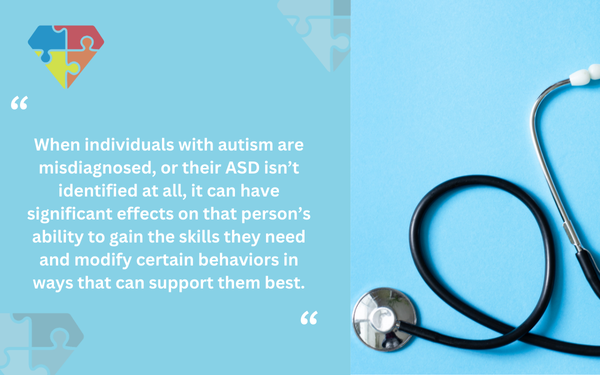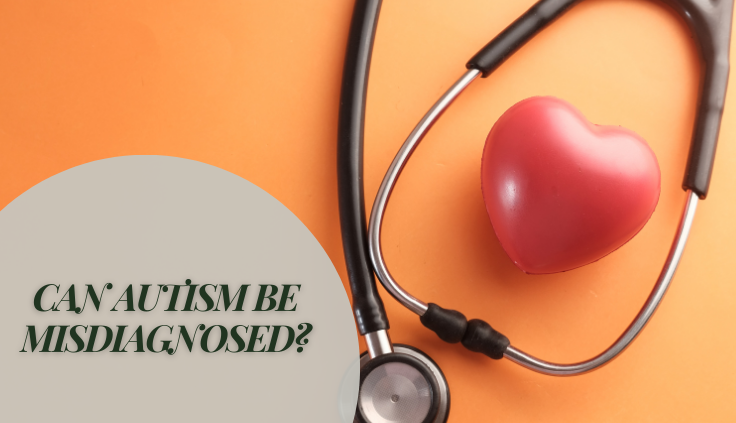Can Autism Be Misdiagnosed?
In the last 25 years, much progress has been made in the understanding of autism spectrum disorder (ASD). Much research and studies have contributed to new screening tools, diagnostic methods and treatment methods.
This research even resulted in the establishment of the ASD moniker in 2013, when five previously-independent but related developmental disorders were wrapped up under one umbrella.
The prevalence of autism in the United States has increased substantially in that same time period, and some experts believe it could be because of the enhanced and improved screening and diagnostic tools that are used today. In other words, it’s possible that there aren’t actually more cases of autism, but rather more children are being accurately diagnosed.
At the same time, the question still remains: Can autism be misdiagnosed? We’ll discuss that, as well as the challenges surrounding autism diagnoses, below.
Take the online autism test now
Table Of Contents
How is Autism Diagnosed?
The first step to addressing the above topic is understanding how autism is diagnosed in the first place.
It’s important to recognize that there is no medical examination or blood test that can identify ASD. Instead, all diagnoses are made based on the exhibition of certain signs and symptoms.
The Diagnostic and Statistical Manual of Mental Illnesses (DSM-5) outlines criteria for what constitutes ASD. This includes facing deficits in communication and social interaction; restricted, repetitive patterns of interests, behaviors or activities; and the disturbances not being better explained by either a global developmental delay or intellectual disability.
Official diagnoses rely on a number of different tools, including early screening methods such as the M-CHAT as well as evaluations and parent/caregiver feedback. ASD diagnoses are often given by clinical psychologists, developmental pediatricians and other professionals specifically trained in the field.
Can Autism Be Misdiagnosed?
Simply based on the diagnosis process itself, autism can be misdiagnosed. While the DSM-5 provides clear guidelines for what needs to be present in order for an ASD diagnosis to be given, there is still a lot up for subjective interpretation.

Compared to a blood test that can definitely tell if someone has diabetes, for instance, it’s possible for two clinical psychologists to have different opinions on whether the same child has autism.
Not only that, but ASD can present itself in different ways in different individuals. Some individuals may be able to “mask” or hide their autism symptoms so that they fit in with others, and some of autism’s symptoms also overlap with that of other conditions.
For example, the ritualistic or repetitive behaviors that someone with autism displays might look similar to how someone with OCD or ADHD would behave.
How Commonly is Autism Misdiagnosed?
A common follow-up question, then, might be how common is autism misdiagnosed? The answer to that question isn’t very clear, since there’s no way to quantify the number of people who have either been misdiagnosed with autism instead of a different disorder, for example, or how many people haven’t been diagnosed at all.
That being said, some recent research has shed some light on the topic.
A 2019 study, for example, examined nearly 5,000 children, finding that almost 25% of them (or 1,135 in total) displayed some of the common autism symptoms but were never diagnosed with ASD.
This, of course, doesn’t mean that all 25% of those children would meet the criteria of having ASD, but there is at least the possibility that some of them would.
Another study from 2021 found that more than 75% of the people who participated received their ASD diagnosis roughly eight years after they first had a mental health evaluation.
Perhaps most concerning, though, is another 2021 study that estimated that between 70% and 80% of people with autism end up receiving a diagnosis for another condition.
What Are the Dangers of an Autism Misdiagnosis?
When individuals with autism are misdiagnosed, or their ASD isn’t identified at all, it can have significant effects on that person’s ability to gain the skills they need and modify certain behaviors in ways that can support them best.

Research has shown that the sooner that early interventions such as applied behavior analysis (ABA therapy) can be started, the more successful they are in helping children with ASD live more independently. When autism is misdiagnosed, that only leads to the delay in treatments such as ABA therapy, or the absence of it altogether.
This is a big reason why continued advanced research is needed to help support the professionals who diagnose and treat children with ASD.
Blue Gems ABA Evaluates Children for ASD
Autism is a neurodevelopmental disorder that can be misdiagnosed. Since there is no blood test or medical exam that can identify ASD, there are possible ways in
At Blue Gems ABA, we have a team of experienced clinical psychologists who evaluate children for autism and give an ASD diagnosis when appropriate. If such a diagnosis is given, we have a team of experienced BCBAs who administer ABA therapy to help patients gain the communication, social and daily life skills with which they commonly struggle.
To learn more, please contact us today.




